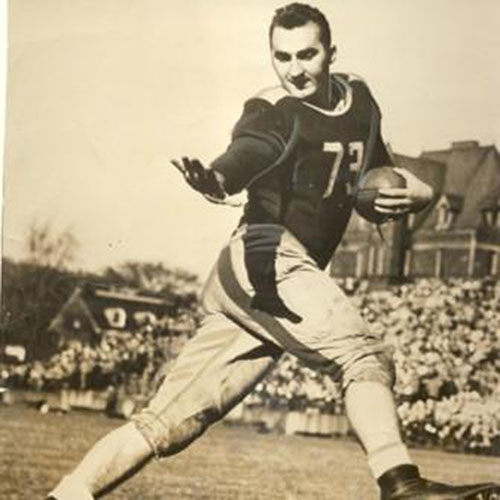On October 18, 1945, Joe Krol joined the Toronto Argonauts, a talented squad that had already clinched a playoff berth. A seventh consecutive postseason clash with their arch-rivals, the Ottawa Rough Riders, for the Big Four title, eastern Canada’s premier ‘interprovincial’ football league, loomed.
Because of this red-and-black stumbling block, the Argonaut faithful had grown accustomed to the disappointment of the team failing to reach the inter-league playoffs for the Grey Cup in each of the previous three seasons. On the field, the rebuilding Argos had exceeded expectations in 1945, but no one forgot that the Ottawa ‘huskies’ had thrashed the Double Blue in both regular-season encounters.
Joe Krol, called “King” Krol, takes a stride ahead.
Back in September, when the Argos’ roster was recreated after a three-year hiatus due to the war, club chairman Tommy Alison, team manager Earl Selkirk, and head coach Teddy Morris attempted to convince Krol to wear a double-blue sweater. It’s understandable. The 26-year-old running back had led the Mustangs to an intercollegiate title and delivered the first Grey Cup to Steeltown in almost a decade in just six seasons after starting his sophomore year at the University of Western Ontario.

With an unbalanced seven-man line, both guards lining up on the strong side of the center, and direct snaps to whichever back would carry or throw the ball, the single-wing system was popular at the time. The ‘deep’ halfback, who lines up behind the center in a shotgun formation, has the option of carrying the ball, attempting a pass or lateral to another back or one of the ends, or kicking for points or superior field position. As a result, the game’s top deep backs may injure an opponent with their foot, passing arm, or kicking leg.
Joe Krol holds the record for most triple-threat players in Canada. It took a long time for him to clinch a contract with the Argos. The Boatmen’s contract offer piqued Krol’s interest (especially since it included a lucrative insurance position as a bonus), but he wanted to try out for the Lions first. The Big Four season was almost finished by the time he left the NFL and became an Argo.
Krol began his Argonaut career in civvies in the press box at Varsity Stadium while his contract was being approved by the league. As he watched his new teammates battle the Hamilton Tigers, he saw that the Boatmen had a tough line of wily veterans and a group of promising but inexperienced rookie backs. With three minutes remaining, the Argos had fallen behind 10-8 to the visitors.
When running back Royal Copeland turned the jeers into cheers by taking a second-down snap seventy yards for a spectacular touchdown, zigzagging and zagging across the field before making his trademark dive into the end zone, the crowd loudly reminded the home players that no game against the Tigers was ‘meaningless,’ no matter what the standings said.
Teddy Morris and Copeland, a talented athlete with a lion’s heart, had a temperamental match, and together they gave the ‘Big Blue Machine’ vigour and passion. Krol’s wiring was out of the ordinary. He made his reputation in the cockpit, where he piloted the Morris machine to three Grey Cup victories in a row with his unique blend of immaculate talent, nonchalant swagger, and deadly killer instinct.
Krol made his Double Blue debut at Molson Stadium in Montreal on the final day of the season, spending thirty minutes getting to know his new teammates and Morris’s system. He threw four touchdown passes to Copeland in the second half, setting a club record for touchdown catches in a game that stands today.
The Boatmen won the first leg of their home-and-home playoff series against Ottawa 27-8 at Varsity seven days later. In front of the Argo fans, Krol threw four more touchdown passes, hammering the Riders for the first time. He also caught a ball from Copeland for a nice gain, and he had an outstanding home debut with three big defensive tackles from his safety position.
What a fantastic method to make a favourable first impression.
Teddy Morris and his Big Blue Machine compiled a 14-7-3 league record and a postseason undefeated streak over the course of twenty-four months, including three consecutive Big Four championships, three consecutive Eastern Final victories, and three consecutive Grey Cup victories on Bloor Street. Along the way, Joe Krol was a consistent all-star, winning the Lou Marsh Trophy for the first time in a team sport and being named Canadian Press athlete of the year twice.
